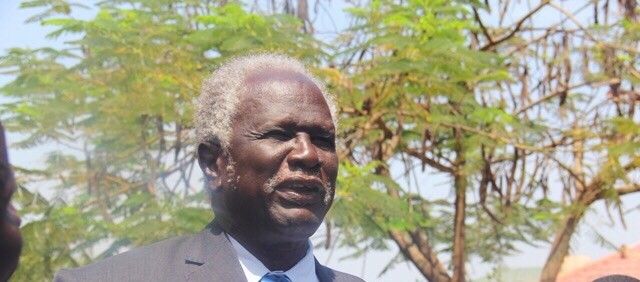South Sudan’s elections commission has not yet received the funds that it needs to carry out the poll that General Salva Kiir has ordered take place this year ahead of the expiry of his term in office in July, according to the head of the commission.
In an interview with Radio Tamazuj yesterday, National Elections Commissioner Abednego Akol Kacuol ackowledged that the commission has not received the necessary funds in their account to make the preparations for the poll, saying this is a ‘big obstacle’ facing the commission.
There are only 5 months and 17 days remaining in the president’s term in office, which is limited by Article 100 of the Transitional Constitution. On 9 July he will cease to be the constitutionally legitimate president unless either the constitution is amended or a census and election are held.
Thus far Kiir has repeatedly avoided committing to a power-sharing deal with the rival SPLM-IO faction that would make him president during a transitional period of up to 30 months. Such a deal if ratified by a two-thirds vote of each house of parliament would effectively be adopted as a part of the constitution allowing Kiir to remain in power by constitutional means.
Neither have members of his government openly discussed the alternative possibility of amending the constitution by parliamentary vote without a peace agreement; securing the necessary votes in such a circumstance would be more difficult than for ratifying a peace deal.
On Christmas Eve last month, Kiir presiding over a sitting of the Council of Ministers ordered the allocation of 1.5 billion South Sudanese pounds for carrying out the poll.
Subsequently, the parliamentary opposition leader Onyoti Adigo demanded that this amount not be spent without approval from parliament, raising questions about whether Kiir would be able to secure parliamentary approval for the poll, given recent challenges he faced from parliament.
Since last October Kiir sought to pass the National Security Service Bill 2014 but was stymied repeatedly by lack of quorum: most of the caucus from Equatoria boycotted the vote and numerous MPs from the greater Upper Nile region also were absent.
Commissioner Abednego, speaking yesterday, was asked whether the Commission has received yet the special elections budget of 1.5 billion SSP. He responded, “No, up to the point that I am speaking to you now we have not received it. And this is a big obstacle.”
However, separately the commissioner yesterday announced appointment of state elections chairpersons and members of the elections committees in the states. Abednego convened a press conference on Wednesday for the swearing-in ceremony at Juba Regency Hotel.
He said the committee members will go for training on the elections act in order to ensure that the election will be free and fair.
“Today, we have witnessed a swearing-in of the state committees’ members for the election commission in the ten states and it was witnessed by the head of the Supreme Court which is a good start,” he said.
Akol was asked about whether conflict-displaced people will be able to vote. He said that he visited the three conflict-affected states of Jonglei, Unity and Upper Nile and said that voters inside the internally displaced camps will have the right to register and vote, except in Abyei, which remains a territory claimed by Sudan.
At the press conference he was again asked about the issue of finances and about when the registration will start. “Up to now as I am talking, I did not receive any amount of money for running the elections, but I have the hope that money will come tomorrow,” he said.
The elections budget of 1.5 billion pounds as announced by the Council of Ministers is equivalent to more than 10% of the 2014/2015 annual budget. However, it is not included in the 2014/2015 annual budget.
Abednego has defended the president’s right to allocate the money, saying the allocation could be approved at a later sitting of parliament.




